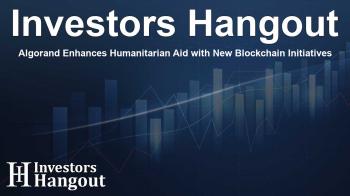Algorand Enhances Humanitarian Aid with New Blockchain Initiatives

Algorand Expands Efforts in Humanitarian Aid through Blockchain
The Algorand Foundation recently took a significant step forward by convening its Humanitarian Aid Payments Council, a collaborative group formed by leaders in blockchain, humanitarian sectors, and finance. This gathering is dedicated to exploring effective blockchain solutions to enhance the delivery of humanitarian aid. The recent meeting took place to address strategies for optimizing aid disbursement using blockchain technology. The Council is excited to welcome new members, including notable organizations such as UNHCR, Mastercard, Paycode, Coala Pay, Meld, and Rahat, enhancing the diversity of expertise within the Council.
Understanding the Humanitarian Aid Payments Council
The Humanitarian Aid Payments Council is composed of influential representatives from various sectors. Members include organizations like Circle, Mastercard, Worldpay, HesabPay, and others who are dedicated to shaping the future of humanitarian aid. Discussions during the meeting emphasized the vital need to advance beyond preliminary projects and fully scale the impact of blockchain in aid distribution. The integration of blockchain technology can fundamentally transform the efficiency of aid delivery.
Key Discussions on Scaling Humanitarian Aid
During the meeting, council members shared insights on the importance of comprehensive involvement from all stakeholders in the aid chain—ranging from donors to implementers. Such understanding of blockchain's potential across different aid specialties is crucial for impactful scaling. Algorand Foundation introduced its innovative Aid Trust Portal, designed to track and visualize humanitarian aid transactions seamlessly, further promoting transparency in the sector.
Success Stories from Blockchain-Enabled Solutions
The Council has already witnessed the positive effects of blockchain payments on humanitarian efforts. One successful example is from HesabPay, which has developed a digital wallet powered by the Algorand blockchain. This wallet has been deployed successfully in regions like Afghanistan and Northeast Syria, where partnerships with multiple UN agencies have enabled safe and direct aid payments to tens of thousands of families.
Creating Trust Through Transparency
Matt Keller, Director of Impact at Algorand Foundation, voiced the organization's commitment to utilizing blockchain technologies, especially in regions where traditional banking systems are ineffective. He highlighted how this initiative seeks to provide donors and beneficiaries with the necessary transparency and traceability in aid distribution. The goal is to empower recipients with secure digital payment methods that enhance their dignity and agency in receiving aid.
Envisioning a Future of Empowered Humanitarian Aid
Looking ahead, the Humanitarian Aid Payments Council envisions a future where humanitarian assistance is defined by security, transparency, and efficiency. Blockchain technology facilitates low-cost and rapid payments, which align perfectly with the objectives of global aid systems. The Council aims to further advance the application of blockchain technology, fundamentally changing how cash assistance is delivered to those in need.
About Algorand
Algorand is committed to fostering a world where information integrity and scalable innovations thrive. Since its inception in 2019, the Algorand blockchain has developed into a dynamic ecosystem engaged with developers, entrepreneurs, and partners, all benefiting from its reliable resilience and institutional-grade security. The platform's low transaction fees, rapid finality, and minimal environmental impact cater to millions of users and developers. Creators operating on Algorand are pioneering various crucial applications, including secure identity solutions and supply chain transparency. To explore more and embark on your journey with Algorand, visit their official website.
Frequently Asked Questions
What is the Humanitarian Aid Payments Council?
The Humanitarian Aid Payments Council is a collaborative group led by Algorand that includes leaders from blockchain, humanitarian organizations, and finance focused on optimizing humanitarian aid delivery through blockchain technology.
Who are some of the new members welcomed into the council?
New members include UNHCR, Mastercard, Paycode, Coala Pay, Meld, and Rahat, bringing diverse expertise to the council's initiatives.
How does blockchain technology impact humanitarian aid?
Blockchain enhances transparency, security, and efficiency in aid distribution, allowing for secure digital payments and ensuring accountability in transactions.
What is the Aid Trust Portal?
The Aid Trust Portal is an online platform introduced by Algorand to track and visualize humanitarian aid payments, promoting software for improved transparency.
What future initiatives are planned by the council?
The Council aims to expand the use of blockchain technology in humanitarian aid, focusing on scaling efforts to provide secure and efficient aid delivery across various regions.
About The Author
Contact Evelyn Baker privately here. Or send an email with ATTN: Evelyn Baker as the subject to contact@investorshangout.com.
About Investors Hangout
Investors Hangout is a leading online stock forum for financial discussion and learning, offering a wide range of free tools and resources. It draws in traders of all levels, who exchange market knowledge, investigate trading tactics, and keep an eye on industry developments in real time. Featuring financial articles, stock message boards, quotes, charts, company profiles, and live news updates. Through cooperative learning and a wealth of informational resources, it helps users from novices creating their first portfolios to experts honing their techniques. Join Investors Hangout today: https://investorshangout.com/
The content of this article is based on factual, publicly available information and does not represent legal, financial, or investment advice. Investors Hangout does not offer financial advice, and the author is not a licensed financial advisor. Consult a qualified advisor before making any financial or investment decisions based on this article. This article should not be considered advice to purchase, sell, or hold any securities or other investments. If any of the material provided here is inaccurate, please contact us for corrections.

